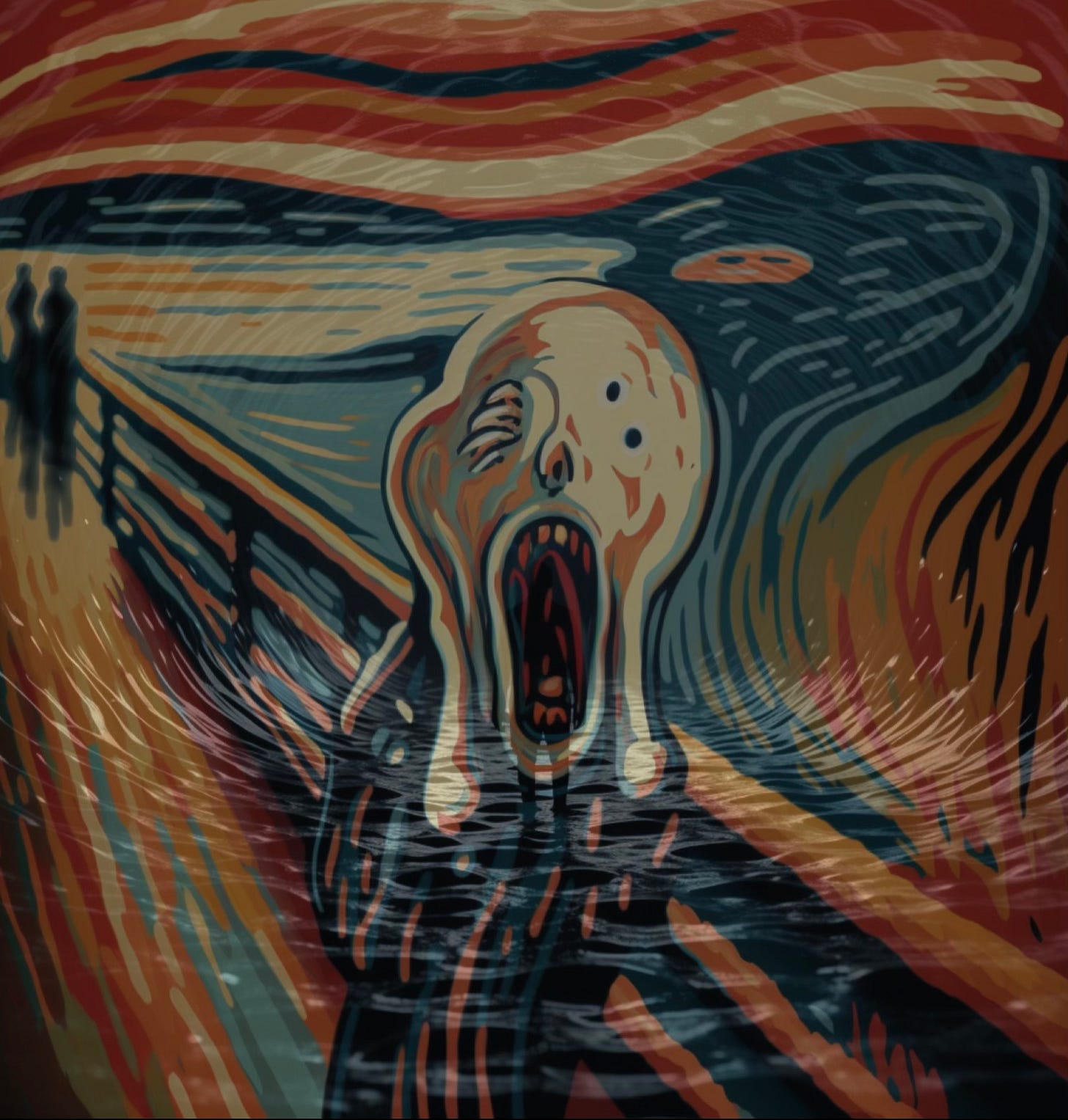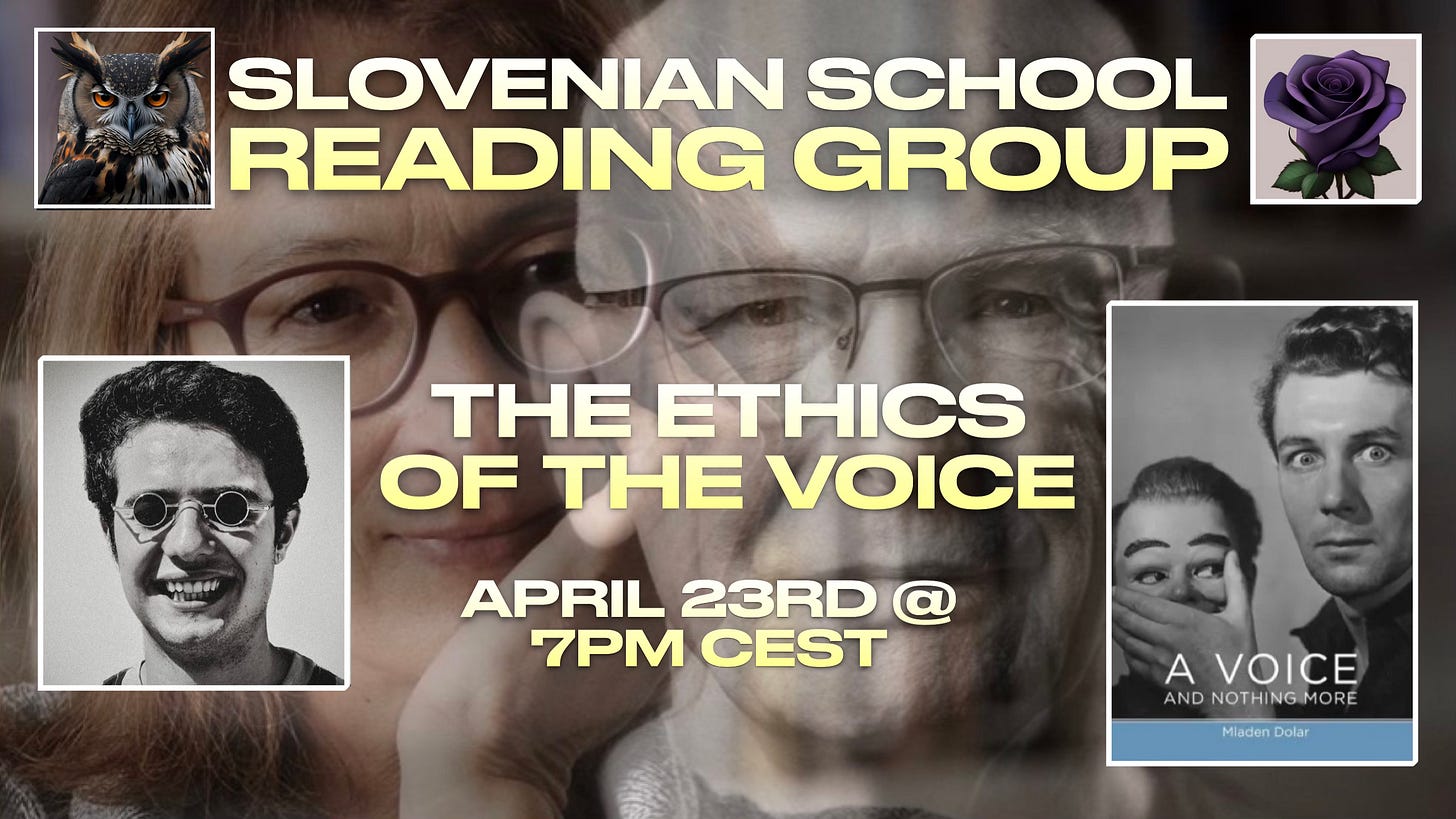A Voice and Nothing More
Early Reflections on Dolar's work and the Philosophy Portal Reading Group
The symbolic order (big Other, cultural matrix) of our world parasitises the workers body to such an extreme degree in today’s society. Consequently, it is simply impossible for the large majority of workers to ever think about supporting a family, owning a home, or planning for retirement. We just have national structures unable to castrate millionaires and billionaires, and instead draining whatever little assets remain out of working people who are unable to make enough to just make ends meet. In this situation, there are temptations to intellectually reify a religious symbolic order (typically “right-wing”) and temptations to intellectually reify positive transformative potentials of the body (typically “left-wing”) both as defences against the absolute destitution and lack of dignity the large majority of us feel in our work.
The logic is something like: “if I cannot live a dignified life in my work, capable of supporting a family, owning a home, and planning for retirement, at least I can surround myself with religious imagery of my specialness in the light of God” or “at least I can take direct control over the flows of jouissance that constitute my body”. This is not a straw-man: I have literally seen people move from radical immersion in bodily transformation for excess jouissance to regressive reactionary religious identification; and I have literally seen people move from regressive reactionary religious identification to radical immersion in bodily transformation for excess jouissance.
What perhaps both reactions need to think is that the only thing we really have in-between the order of signifiers and our actual body is the scream of the voice (and nothing more), that which links the signifying order beyond our control to the impotent body given to us by the structure of our self-appearance to ourself. This scream in and for itself does not know the “special light of God” and nor does it know “direct control over the flows of jouissance”, but rather just knows the abyss of its condition and situation, it knows the absolute discrepancy, or the “unbridgeable gap”,1 between the body and its place in the symbolic order (i.e. that the symbolic order does not care, and that one does not control one’s relationship to the body).
Thus, what we find as the “voice and nothing more” in this “unbridgeable gap” between “my body” and “my culture” is the real (where one experiences a minimal distance between “me and my body” as well as “me and my culture”). In this way, we should understand the “Christian Atheist” insistence of Christ’s moment on the cross — “Father, why have you forsaken me?” — as this “real of the voice itself” where the subject is both alienated from one’s body as well as the symbolic order. In this sense, Christ is radically “unnatural” (not reducible to one’s natural body) and “uncultured” (not reducible to the laws of the symbolic order), but rather stands for the real of the “drive body” and death drive itself (not as an absolute destruction, but an absolute creative destruction which founds a new relation to the natural body and the symbolic order).
It is in this precise dimension where we can think of the “Cultural Christian” as “perverted” in instrumentalising Christ to a “cultural normativity” basically at war with the “natural body” and its gap; but we can also think of “Woke subjectivity” as “perverted” in instrumentalising the natural body itself as within the realm of our egoic conscious self-control (again closing the gap and loss of control).
Over the last few years, in both working within the field of Žižekian philosophy, while also interfacing with many disparate or other philosophical/thought communities, there is a repetitive insistence on the positivity of the body and a rejection of language as epiphenomenal to the body itself. This move at once suggests one’s absolute alienation in our current societies symbolic order (which as mentioned, absolutely parasitises the worker’s body, making for an unliveable world, a world without basic social dignity); but it also suggests a total foreclosure of the drive body itself, the scream of the voice which ties the signifier to the body.
Why would this dimension of the drive body, and specifically the voice, as the “echoing locus” of our discourse be foreclosed and instrumentalised? Because to go into speech itself — those talking about “embodiment” are always so quick to “speak about it” to “tell us about it” to “make sure we agree” — is a “leap of faith” where (if we are being honest) we never really know what we are going to say before we say it. There is a brutal abyssal contingency to actually speak, one that (Kantian) academics and fundamentalists alike will foreclose through pre-programmed speech (a priori categories) that prevents the risk of freely speaking. To freely speak, to let the voice of the drive body take over, is at the same time a revelation, an exposure of some “hidden intimacy” deeply connected to “shame” about the unbridgeable gap between the body and the symbolic order.2
In actually taking a “leap of faith” in the living voice of the drive body we risk revealing and exposing the fact that our speech is not always “perfectly beautiful”, nor always “unified with a meaning”, but rather is just an excessive “stain on perfection” and also a “disruption/interruption” of meaning. One encounters this dimension in “stage freight” where one’s pre-programmed script falls away and you are left as a “naked stain” stripped of “All meaning”, just a transparent real of what is always-already “primally repressed” (that you do not “have” or are not the “embodiment of” the “real signifier”, that the “real signifier” is “missing” and you are “lost”, just a “lacking subject”). The demand for beauty and meaning is the demand to close the unbridgeable gap between the symbolic order and the body, to close the real of the drive body and its screaming voice.
At the same time, philosophy after Lacan is not only dishonest if it clings to the illusions of a perfect beauty or a stable meaning (clear symbolic differentiation); it is also dishonest if it simply clings to the naked scream, the abyssal voice of the drive body (pre-symbolic undifferentiation). The former position is a self-hiding from the shame of the naked scream (will not accept it within itself); the latter position does not enough know enough shame for the naked scream (just brutally exposes itself to the other who is also castrated and broken). What is rather at stake in philosophy after Lacan is the founding of a symbolic order by forms of subjectivity capable of accepting within oneself their naked scream/abyssal voice of the drive body. These forms of subjectivity constitute creation on the level of the first cause of subjectivity, the object-cause of desire alienated from the all-knowing Father, the way the abyssal void is “filled” with the formless form of objet petit a. On this level we find perfection in a “glitching” and we find a meaning in “repetitive tics” that may appear to be stains and disruptions from the point of view of ordinary consciousness labouring within illusions of perfect beauty and stable meaning. They are the results of a subjectivity that is itself a “leap of faith” on the level of the abyssal voice of the drive body.
Here we can think the consequences of Lacanian psychoanalysis for Platonic philosophy as well as post-modern nihilism, and the way Lacan’s work short-circuits both. Lacanian psychoanalysis as well as post-Lacanian philosophy are central because the “lack in the Other” becomes foundational, and the dimensions of the “true-good-beautiful” forms become secondary manifestations of the “lack in the Other”. This leads again to an unavoidable encounter with the disruption and stain of one’s own voice, but also that the disruption and stain of one’s own voice founds a new symbolic order.
Join here: Slovenian School Reading Group.
Dolar, M. 2006. A Voice and Nothing More. MIT Press. p. 7.
Ibid. p. 80.






Haha! Sheesh, shots fired, no prisoners taken! I was listening whilst cooking a meal for my family but it was clearly Cadell that was cooking (me) through the disembodied AI voice on my phone speaker. I relate deeply to many of the co-ordinates here, both in myself and in what i'm seeing and hearing in others. I appreciate the neat mapping and reflection, it also tracks with how I experience and locate Philosophy Portal as some kind of para-clinic laboratory of psychoanalytically informed free speech and philosophical work. Cadell himself having said at some stage that the revolutionary act today is creating spaces for (free) speech (the voice) [understanding that notion properly of course].